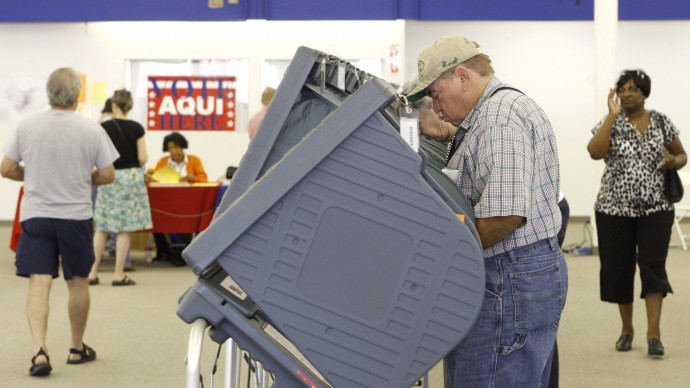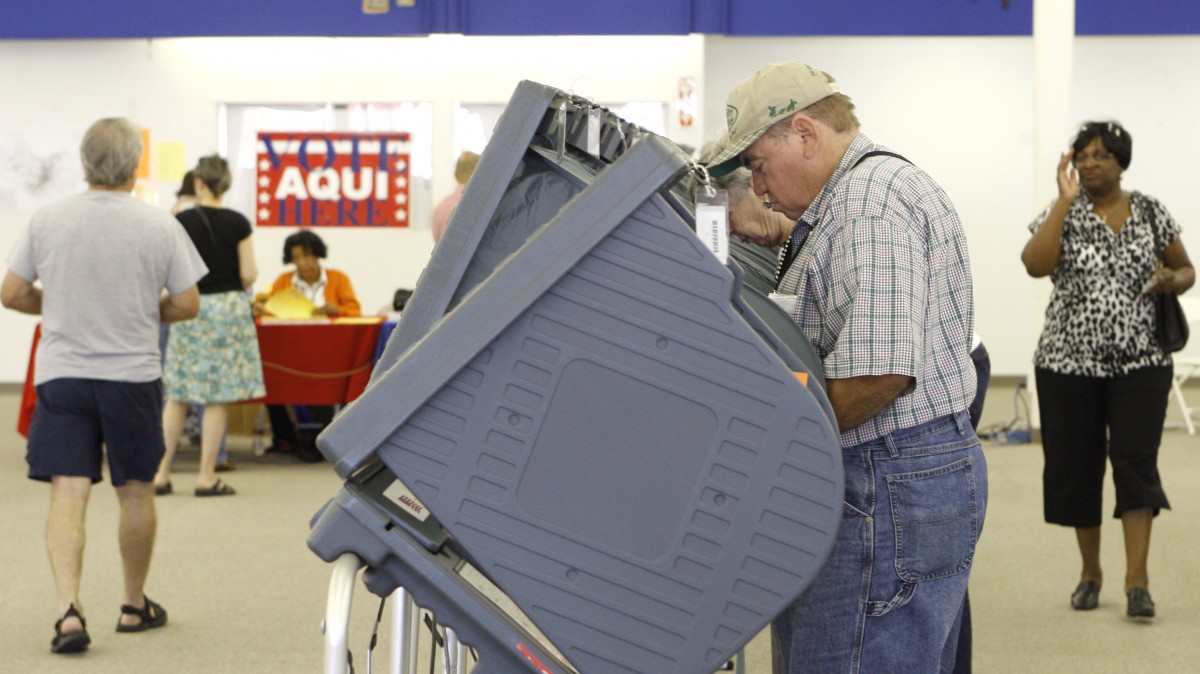
(MintPress) – In a statement dated Oct. 30, Iowa Secretary of State Matt Schultz announced that international election monitors observing the upcoming national election in the state will face arrest and criminal charges if they attempt to be present at polling places Election Day, as reported by the Des Moines Register. The Telegraph reports that Texas’ Attorney General, Greg Abbott, has made similar threats against observers who attempt to audit his state’s polling places. The Organisation for Security and Cooperation in Europe (OSCE) — an Austria-based watchdog group “which usually reacts harshly to the [electoral] violations of other countries” — is taking the unusual step of investigating the upcoming national election for evidence of voter suppression.
Invited by eight civil rights organizations—including the National Association for the Advancement of Colored People (NAACP), the OSCE has been asked to monitor the upcoming election in order to ensure that voting procedures comply with the standards for democratic elections and international obligations.
“OSCE election observers are bound by a strict code of conduct, requiring them to maintain impartiality in the conduct of their duties, to perform those duties in an unobtrusive manner, and to not interfere in the elections in the United States in any way. They are not election police or referees. They will not play any role in counting votes or resolving election disputes. Their only role is to observe the process and to report on the degree to which that process meets the commitments that the United States has agreed to uphold,” according to the organization’s website.
Texas’ and Iowa’s threats are dubious, at best. At question are state laws that require that lobbyists and politicians clear all polling stations by at least 100 feet. The OSCE has previously observed American mid-term elections in 2002, 2006 and 2010, and general elections in 2004 and 2008.
In its documentation, the OSCE has attested to obeying all individual states’ laws in regards to observation, and the Copenhagen Document, signed by George H. W. Bush’s secretary of state James Baker in 1990, permanently extends an invitation for the organization to observe all elections in all states.
The Organisation for Security and Cooperation in Europe is a political negotiation and regional security forum with 56 members in Europe, Asia and North America — including the United States. It monitors and mediates national and international concerns involving arm control, confidence- and security-building measures, human rights, national minorities, democratization, policing strategies, counter-terrorism and economic and environmental activities, among others.
As of recently, the U.S. State Department has worked with the OSCE to monitor extranational elections, including those in Russia.
A fine mess
In a letter to U.S. Secretary of State Hillary Clinton, Abbott responded to an OSCE request to the State Department requesting unrestrained access to polling areas by asserting that the observers will receive no special accommodation from the state. Abbott added:
“In addition to my desire to defend and enforce Texas election laws, I am also concerned that an unnecessary political agenda may have infected OSCE’s election monitoring activities. The OSCE has published policy recommendations and other reports that raise objections to state laws that prohibit convicted felons from voting, prevent voter registration fraud, and require voters to present a photo identification at the polling place. The OSCE may object to photo identification laws and prohibitions on felons voting-but our nation’s Supreme Court has upheld both laws as entirely consistent with the U.S. Constitution. And perhaps ironically, the OSCE representative leading the mission to the United States hails from the Netherlands, which has a photo identification law for voters. According to the Dutch government’s official website: “checking identity documents helps fight fraud.” Why the OSCE appears to now question voter identification laws in the United States is beyond reason. Perhaps it is just politics. Regardless, the OSCE’s perspective on Voter ID is legally irrelevant in the United States.“
Abbott continued by accusing the OSCE of working with Project Vote, which he claims is highly affiliated with the Association of Community Organizations for Reform Now (ACORN) — a now-defunct cooperative of community-based organizations that advocated for low- and moderate-income families.
A favorite target of Republicans, who claimed that the organization was involved in voter fraud and federal funds mishandling, the organization was cleared of all charges when it was revealed that James O’Keefe and Hannah Giles — two conservative activists — falsified and selectively edited video accusing the group. The organization ultimately declared bankruptcy and disbanded.
On Oct. 24 — a week before Abbott’s letter to Secretary Clinton — Project Vote issued a press release admonishing Abbott for not protecting the rights of Texas voters. Project Vote is one of the largest nonpartisan voting rights organizations in the country and one of the not-for-profits that issued the invitation to the OSCE.
In an Oct. 29 press release, Ohio Secretary of State Jon Husted stated:
“Only an election official, an observer, a police officer, a person reviewing the 11 a.m. or 4 p.m. list of registered electors, a voter (including the voter’s children who are of nonvoting age when accompanied by the voter), or a person assisting another person to vote shall be allowed to enter the polling place during the election. By not including “international observers” and others not specifically listed in state law, the Ohio General Assembly has prohibited their presence in a polling place on Election Day.”
In a June 13 directive, Husted clarified that only “qualified electors in the State of Ohio” may serve as observers.
All of this may be a top-down effort. As of Oct. 23, Fox News started to comment on international observers. On the O’Reilly Factor, Fox personality Kimberly Guilfoyle called the monitoring “meddling of a bizarre nature” and claimed that amongst the election monitors are “members from terrorist countries”. The following Wednesday, Dennis Miller claimed that the OSCE is “going to make sure Jews don’t vote.” The O’Reilly Factor’s host Bill O’Reilly imagined the New Black Panthers assaulting the observers.
On Friday, Fox News contributor Dick Morris claimed — via video — that election monitoring may constitute an U.N. coup d’etat. As stated by Morris:
“The threat we face is from the United Nations. Now, I’m not literally suggesting that black helicopters are going to land on the Rose Garden and blue-helmeted U.N. troops are going to do a coup d’etat. But figuratively speaking, that is a metaphor for what’s going on at this point. Just two weeks ago, or last week, the United Nations announced — get this — they are going to send monitors to observe elections in the United States to determine that our elections are fair and free.”
ABC News on Oct. 24 filed a report that begins, “The upcoming presidential elections will be observed by election monitors from countries that have their own issues with democracy. … As CNS News reports, 12 of those monitors come from countries that Freedom House ranks ‘not free,’ specifically Azerbaijan, Belarus, Kazakhstan and Kyrgyzstan, and six come from countries ranked ‘partly free.’”
It’s fair to say that emotions are being stirred, and not just in the United States.
In Russia, the Foreign Minister accused Washington of “double standards” and blasted the OSCE for failing to stand up to state authorities. The OSCE has failed to react correctly or condemn the behavior of state officials in Texas, the ministry stated — as reported by the Telegraph.
According to the ministry, the U.S. State Department has reacted “very limply” to this situation, despite loving “lecturing the rest of the world about democracy and human rights.”
“When it comes to the obvious defects of the American electoral system, [the U.S.] prefers to make reference to its own laws, which partly contradict democratic norms and principles” the Foreign Ministry said in a statement. “The U.S. electoral system is decentralised, fragmented and obsolete.”
Russia was accused by the OSCE of widespread voter fraud in the re-election of Vladimir Putin.
The problem at hand
The American electoral system is unique due to the unique structure of the nation. The United States is a federation of independent states, each of which has its own constitution, military, economic structure, central government and unique set of needs and wants. As such, any national election would be an exercise in power-sharing.
The presidential election reflects this; the Electoral College — the ad hoc assembly of party loyalists and political celebrities that actually elects the president — is, for the most part, a stand-in for the congressional delegates to whom votes actually go to in order to select the commander in chief. As the people do not directly elect the president — their representatives and senators do by means of state-chosen electors — the process can fairly be seen as inadequate for a nation claiming to be a democracy.
There’s also the other stuff that has been happening that is drawing the world’s ire. It may be that this country does indeed need election observers.
In the last two years, voting access in this country has met more challenges than it has in the previous two decades. For example, in New Mexico in July, the secretary of state officially ran out of voter registration cards, causing many to forego registration. This drought was, in part, due to a mailing of over 177,000 registration postcards to inactive voters suspected not to vote in the general election.
By definition, this is voter caging, or the specific solicitation of voters only to remove them from voting rolls for non-response. This is banned by consent decree between the Democratic and Republican National Conventions.
The RNC has tried and failed to vacate the decree multiple times. They are currently petitioning to have their motion to vacate heard en banc.
Voter ID laws have grown exponentially recently, thanks in part to American Legislative Exchange Council’s (ALEC) authored legislation.
For the 2012 election, four states require strict photo identification (a state-issued ID only), seven requires any type of photo identification, three require strict non-photo ID (one piece of identification showing the voter’s photo, name and address OR two pieces of ID showing the voter’s name and address), and sixteen requires any type of identification.
The problem lies in the way these laws are typically worded. For example, the Texas law allows gun licenses to be used as an ID, but not student IDs — excluding a large section of the Democratic base. In addition, according to the Brennan Center for Justice, studies show that as many as 11 percent of all Americans lack state-issued IDs.
In Florida and Colorado, proposed voter purges threatened to disproportionately exclude minorities from voting rolls, in direct violation of the 1993 National Voter Registration Act.
True the Vote, a conservative national elections committee best known for its support of restrictive photo ID laws, has trained and deployed “poll watchers”, whose chief goal — according Bill Ouren, True the Vote’s national elections coordinator — is to make voters feel as if they are “driving and seeing the police following you.” The poll watchers are meant to look for “irregularities” — which may entail making them — and chalking it up as “fraud,” which can be used as ammunition toward tightening voter ID laws, as reported by the Nation.
Florida and Iowa have banned ex-felon voting. Maine has repealed Election Day registration. Kansas and Alabama require citizenship proof to register. Florida and Texas have made third-party voter registration drives more difficult. Florida, Georgia, Tennessee, Ohio and West Virginia have shortened their early voting period, with Ohio and Florida specifically banning Sunday voting in an attempt apparently to block black church voters.


